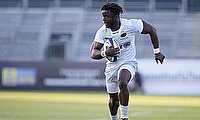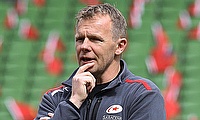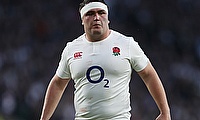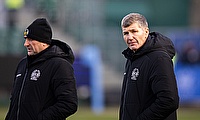Is something "special' really happening at Saracens?
As the final whistle blew at Twickenham on May 28th 2011, it brought the curtain down on one of the closest Premiership campaigns of the professional era, and granted Saracens their first taste of domestic silverware since a Tetley's Bitter Cup victory in 1998. Their hard-fought 22-18 success over the English juggernaut of Leicester Tigers was a testament to the defensive organisation and team ethic that had typified their squad all season, and the club promised the rugby world that this victory was merely the beginning, merely the opening of something special.
Since that historic day at rugby headquarters around thirteen months ago, it seems that everybody connected with 'The Fezheads' (what a ridiculous nickname for a rugby club by the way!) has come out to praise the so-called 'Saracens family ethos' and boast that something special is happening at Vicarage Road, often spoken with a slight South African twang. Their trophy cabinet, however, still awaits another trophy to accompany the lonesome 2011 Premiership title ¦
There is no arguing that Saracens are more of a force in English rugby now than they had been for a long time beforehand. Until the 2009/10 campaign (the season of their first Premiership final appearance), the Watford based side had appeared just once in the end-of-season playoffs, and at the culmination of 2008/09, they could be found in a lowly ninth in the table. However, three consecutive semi-final berths have confirmed the Sarries as one of the Premiership's most consistent clubs, and the fact that they were the only English side to reach the quarter-finals of last season's Heineken Cup is testament to the squad's strength in depth.
Much of the Saracens rise into the upper echelons of European rugby is due to the infamous South African factor. Since the arrival of then-coach Brendan Venter to the club in 2009 there has been a mass influx of South African players to the squad, including the likes of Schalk Britz, Ernst Joubert and World Cup winning captain, John Smit. This influx has provoked continuous criticism from other clubs about their continual move away from their English roots, but the criticism appears to fall on deaf ears; the recent signing of Nick Fenton-Wells (a South African flanker from the Stormers) for the new season is a clear signal that the South African influence on the club is one viewed with positivity and continuing aspiration. Recent attempts to host Heineken Cup pool stage games in Cape Town merely serve as another reminder that the southern hemisphere nation is now intrinsically linked with the black and red shirts of the Saracens.
So should the club's fans be forgiven for remaining highly hopeful of English and European dominance in the seasons to come under the pseudonym of that 'something special', or has it all fizzled out before it's really begun? The performances of last season indeed appear to do nothing to support either side of the argument; whilst Mark McCall's men certainly did not light the world up with their rugby, and failed to claim any silverware, their stoic defence and rigid gameplans ensured they secured knockout rugby in both the Aviva Premiership and the Heineken Cup, and this will bode well for the upcoming season amongst high-profile new signings. An away Premiership semi-final loss to the Tigers at Welford Road was by no means an embarrassment, whilst their exit from the European stage came at the hands of the powerful Clermont Auvergne (many experts favourites to win the coveted trophy this time around). A similar showing this year would certainly not dissuade fans from buying into the Saracens family for at least another season or so. This support will only be strengthened upon viewing the squad roster, where big names such as Chris Ashton and Schalk Britz are coupled with young talent in the likes of Owen Farrell and exciting imports like Joe Maddock and the aforementioned Fenton-Wells.
However, there are those who believe the Sarries' reign of dominance may be waning already, despite a relatively strong looking squad. The club's move away from Vicarage Road (a ground they shared with Watford FC) to the Barnet Copthall Stadium may appear to show a desire for growth and the evolution of the Saracens brand, but it in fact may draw in even smaller crowds, and a lack of a fanbase is something that appears all too obvious when considering attendance in key matches; barely 11,000 people viewed the side's Heineken Cup quarter-final clash against Clermont Auvergne, a pitiful number given the quality of the opponents and the magnitude of the match. If ticket sales don't improve at their new home then questions will be raised about their validity as one of the powerhouses of English rugby.
Another question mark over the Saracens 'special' attributes is their brand of rugby. Mark McCall's men are now famed for their stoicism in defence and a direct kicking game, but a lack of flowing, dynamic attack play has caused much criticism from opposition fans who refer to their style merely as 'boring'. In the recent 2011/12 campaign, the Sarries only scored 35 tries in 22 Premiership matches, a meagre sum that was surpassed by 7 of the 11 opposition sides, and was hugely dwarfed by semi-final conquerors Leicester's total of 69. Whilst the top sides don't always need to score heaps of tries to become the eventual champions, such a deficiency of five-pointers (they claimed only three try bonus points compared to the nine of the Tigers) puts the side at a real disadvantage, and this has been proved in the past when teams have overcome the infamous Plan A of McCall's men and ensured that penalties are given away at a premium.
A quick glance at the big teams of European rugby tells you that Saracens bear little resemblance; unlike the upper echelons and the likes of Leinster, Toulouse and Leicester, the Sarries rely on not losing matches as opposed to winning them, a tactic which often sees their matches going right down to the wire. Some credit must be given, however, in their uncanny ability to come out on the right side of those tight clashes, and this attribute will serve them well in future campaigns.
So, who can truly answer the question of whether this much-touted 'special something' is actually happening in Watford? I am sure that many in the ranks at Saracens would defend it to the hilt, but it is yet to be seen whether they can live up to the tag of the new big thing of English rugby and continually overcome their Premiership compatriots. The next twelve months will go a long way to answering that question of course: given the new stadium, continued influx of South African imports and promise of young English talent, there certainly is an aspirational atmosphere pervading the Saracens camp. However, there still remains huge question marks over the validity of these boastful claims, and I'm sure that there are eleven other Aviva Premiership clubs readying themselves during this pre-season for their opportunity to truly consign this 'special something' to the history books before it has even really begun.








